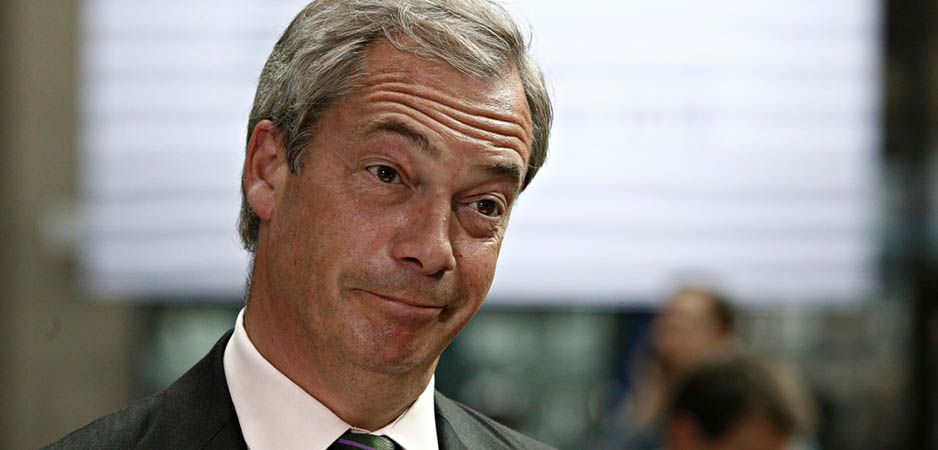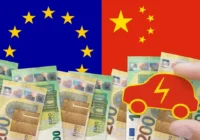The results of the European elections reflect far more than the simple play of party politics and the media’s obsession with hyperreal contests.
The European parliamentary elections have weighed in with tallies gleaned from 28 nations. Perhaps the most awaited results came from the United Kingdom, which is still part of the European Union, dangling by an unwanted thread to the continent. The unexpected presence of Britain has produced what may be the most surreal event of a year full of geopolitical fireworks. Adding to the sheer weirdness of an event nobody in the past has taken seriously is the earnestness of commentators in the media, striving to understand what any of this means in terms of winners and losers or the balance of political power.
The Wall Street Journal offers this summary of the outcome of the elections: “Pro-EU Parties Hold Fragmented Majority in European Parliament.” The Guardian, pushes the analysis further, framing it this way: “A fractured European parliament may be just what the EU needs.”
Here is today’s 3D definition:
Fragmented:
Hyperreal or simply real, as it applies to democracy in the age of the consumer society and social media, in which, by definition, people follow their individual instincts to produce an increasingly incoherent collective result
Contextual note
Can the same phenomenon be real and hyperreal? In the case of today’s democracy, and in a world in which social media permit people to redefine who they are as individuals, the answer is resoundingly: yes.
Let’s first examine why fragmentation reflects the emergence of the real. For the first time in at least a century, reality has begun to displace the established hyperreality of electoral politics, which has long been modeled on the pattern of a sporting match. The hyperreality of the past grew as a necessary feature of what appeared to be stable, semi-ideological camps or parties. To win elections, the two parties recognized as being worthy of governing in most Western democracies had to put forward their hyperreal representation of the world, an artificial vision of social and economic relationships that people could feel comfortable believing in.
The stability of those representations seems now to have disappeared. It isn’t just a question of confidence in politicians. At a deeper level, people are no longer ready to identify with the belief system that parties depended on to govern.
When any hyperreal structure fades or becomes visible for what it is — a simulacrum designed to hide the features of reality — the chaos of reality comes roaring back. This is particularly true in a system that officially encourages transparency, a founding ethical principle of democracy. If constitutional democracy means representation of the concerns and wishes of all the people, a fragmented legislative body should logically be the norm in any democracy. No matter how many cultural values and behaviors the majorities of some nations share (values they generally refuse to critique), democracy and the rule of law suppose the continued existence of a diversity of interests and points of view. Even the very real cases of “tyranny of the majority” that Alexis de Tocqueville warned about, when they occur, seek the means of repressing without suppressing those interests.
The process of political organization and democratic elections should, in theory, always allow such diversity to emerge, even if reduced to the function of a safety valve. When the repressed elements of any society manage to escape from their status of programmed marginality, reality begins to destabilize the reigning hyperreality. The rise of social media has unexpectedly allowed that to happen. The comforting hyperreality of yesterday has been shaken.
But just like nature itself, hyperreality abhors a vacuum. So does human society when values and reliable habits vanish. Societies require minimal agreement on the plot of the story each political entity is composing. At the very moment when traditional political movements fail to suck voters into their hyperreality, social media have provided the latest feature of consumer society: democratically-fragmented hyperreality.
Ironically, the former hyperreal system depended on the perception of a contest between two camps that could be counted on to produce the kind of drama experienced in a stadium in a championship match between two teams. Looking across the European political landscape today, one can see fragmented diversity. But because the pattern of hyperreality requires two contestants, the media have focused on identifying those two, even when they are minorities, or basically random fragments.
In France, for example, the post-electoral discourse focuses on the winner in the same contest that played out in the 2017 presidential race: Emmanuel Macron or Marine Le Pen. This time, Le Pen came out ahead: 23.2% to 22.4%, less than one percentage point. So much for the hyperreal drama.
But the “real” issue across Europe has been between maintaining and building the continent, on one side, and destroying its institutions, on the other. Voters looked in different directions to endorse Europe and spread their votes around to different lists. Something similar but far more surreal happened in Britain. And the media are, of course, happy to focus on personalities such as Marine Le Pen or Nigel Farage to construct their hyperreal representations.
The other hyperreal theme (framed as a sporting match) is the one between populism versus whatever isn’t populism, which is usually identified as traditional party politics, as if the parties haven’t always been contaminated by an attenuated form of populism. The news on that front is that one of the most obvious factors of fragmentation and real political forces in France, the yellow vest movement, were nowhere to be seen because they had refused to define themselves politically and were neither populist nor traditionally political. Some of their force may have drifted toward the ecologists, who appear non-traditional and made a spectacular breakthrough.
Historical note
A potentially destructive centrifugal principle has always lurked at the heart of democratic consumer societies since people feel unbound by the choices of others in their pursuit of possessing whatever they can afford. Parties have traditionally played a counterbalancing role to attenuate the destructive cultural effects. They create a sense of a logic of history that justifies the programs and platforms they propose.
The decline of the influence of parties has been accelerating in the past three years. Observers note that in the European elections, “the two largest political groups in the 751-seat legislature lost their combined majority.” Those two groups were essentially composed of traditional centrist national parties. At the same time, and contrary to the perception promoted by some media outlets that have focused on the right-wing populist challenge, pro-European lists still have an overwhelming majority within the European Parliament, which will be greater if the UK actually does leave the EU.
As The Guardian insists, fragmentation may complicate decision-making in Europe, but “genuine political debate might end up making the parliament stronger because it would,” in the words of Dutch historian Luuk van Middelaar, “‘more credibly embody the full spectrum of public opinion in the EU.’” Reality may be messier and hyperreality much neater and cleaner, but Europe needs a dose of reality to redefine itself. Coming to grips with the current fragmentation — which means refusing to cast it in the image of the dying model — may help it build a more sustainable hyperreality for the future.
*[In the age of Oscar Wilde and Mark Twain, another American wit, the journalist Ambrose Bierce, produced a series of satirical definitions of commonly used terms, throwing light on their hidden meanings in real discourse. Bierce eventually collected and published them as a book, The Devil’s Dictionary, in 1911. We have shamelessly appropriated his title in the interest of continuing his wholesome pedagogical effort to enlighten generations of readers of the news.]
The views expressed in this article are the author’s own and do not necessarily reflect Fair Observer’s editorial policy.
Support Fair Observer
We rely on your support for our independence, diversity and quality.
For more than 10 years, Fair Observer has been free, fair and independent. No billionaire owns us, no advertisers control us. We are a reader-supported nonprofit. Unlike many other publications, we keep our content free for readers regardless of where they live or whether they can afford to pay. We have no paywalls and no ads.
In the post-truth era of fake news, echo chambers and filter bubbles, we publish a plurality of perspectives from around the world. Anyone can publish with us, but everyone goes through a rigorous editorial process. So, you get fact-checked, well-reasoned content instead of noise.
We publish 2,500+ voices from 90+ countries. We also conduct education and training programs
on subjects ranging from digital media and journalism to writing and critical thinking. This
doesn’t come cheap. Servers, editors, trainers and web developers cost
money.
Please consider supporting us on a regular basis as a recurring donor or a
sustaining member.
Will you support FO’s journalism?
We rely on your support for our independence, diversity and quality.






